Back to Contents
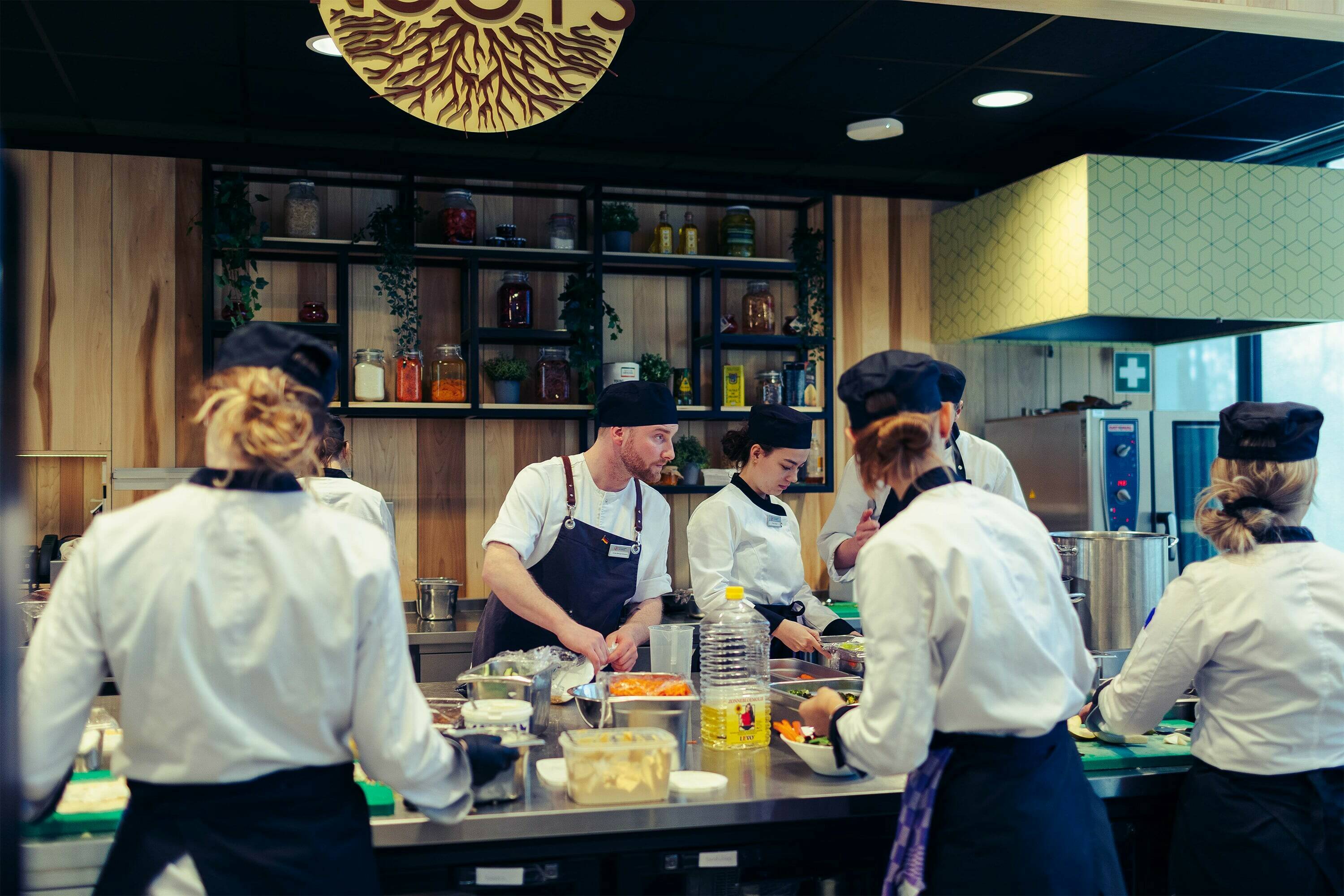
Read Standard
Both campuses of The Hague and Amsterdam are examples of innovative and successful Hospitality Education and profitability.
The facilities in Amsterdam and The Hague are not identical, as the buildings are different. Despite the differences between the buildings, students and staff in The Hague and Amsterdam have access to comparable facilities.
Additionally, both campuses have real-life lab environments, which enable us to offer practical education in all areas of the hotel operations at a high level of quality. Students apply their acquired theoretical knowledge in a practical environment and vice versa. Next to the practical skills of the different outlets, students develop management and leadership skills. Year 2 or Year 3 students lead international teams of Year 1 students. Cultural differences in the broadest sense of the word add an additional dimension to the educational process.
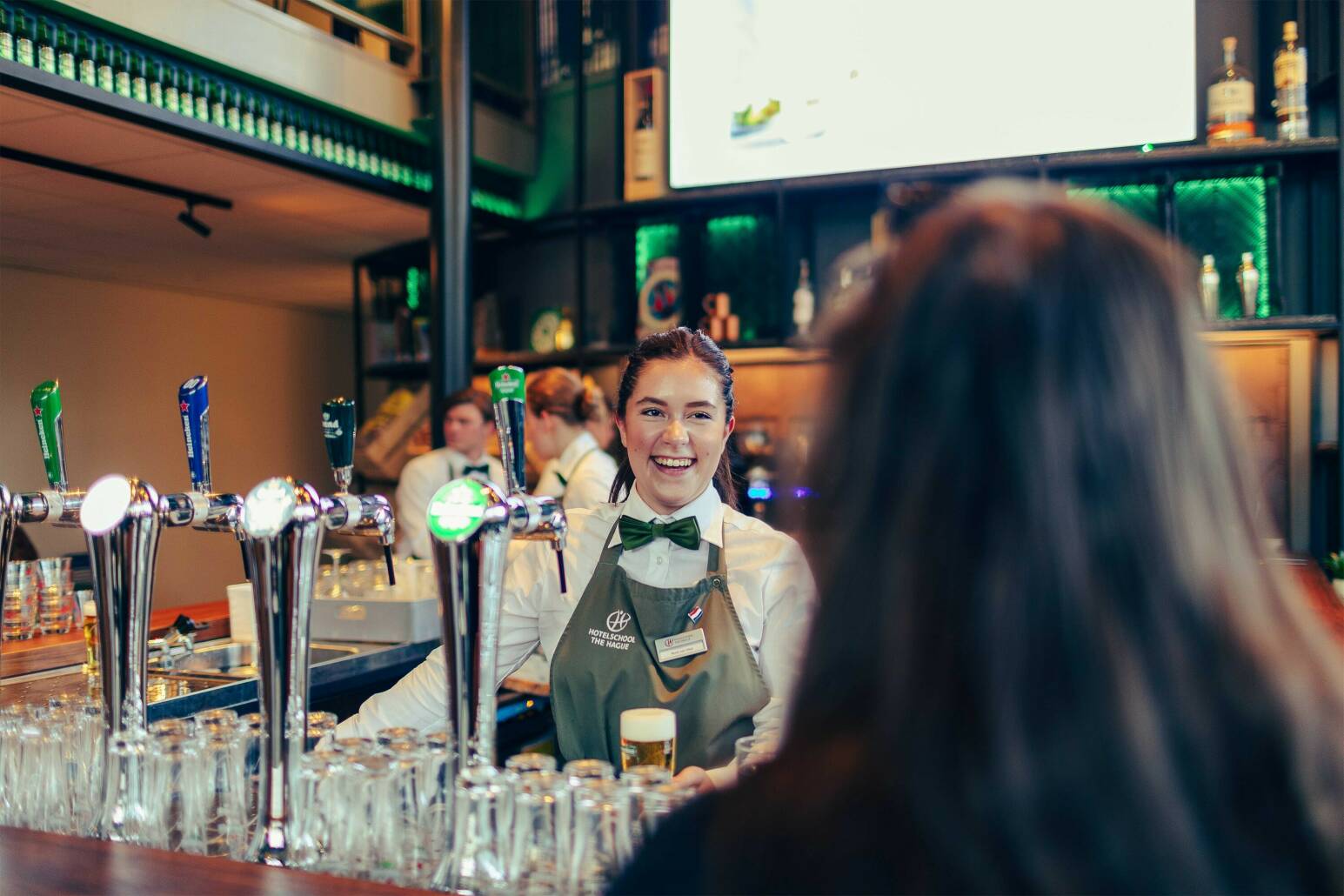
Milestones Completed

Special Feature: Small-Scale and Intensive Education
Hotelschool The Hague’s infrastructure is dedicated to supporting small-scale and intensive education. Beyond the classrooms, the campus provides essential amenities for students to engage in common extracurricular social activities. This comprehensive approach ensures that students not only excel academically but also have the resources and spaces needed to foster a strong sense of community and camaraderie. Staff in Amsterdam and The Hague work in open flexible office space. Whereas in Amsterdam, one floor of flexible space is open for students to connect with lecturers, in The Hague, there are dedicated so-called connectivity spaces where students and lecturers can meet in an informal setting. Students can book classrooms and individual meeting rooms to meet their academic and social needs and have dedicated spaces for HTH student associations and Extra Mile clubs. We believe that Hotelschool The Hague's commitment to providing state-of-the-art facilities enhances the overall learning experience and contributes to the success of its students.
HTH Restaurants
In restaurant Le Début (TH and AMS campus) students perform at both the kitchen and the restaurant. The restaurants allow students to experience the operations of Fine Dining at a high culinary level. Both restaurants are open to internal and external guests.
Mangerie (AMS) and Foodcourt (TH) are both large restaurants where students and employees come together for lunch and dinner. Campus TH has recently been transformed into a Food Court including a Taste Lab with the addition of a new vegan/vegetarian concept named Roots.
Recently, Zinq (TH) and Saveurs (AMS) have both been refreshed in order to stay current and up to date with a modern trendy interior. In addition, both TH and AMS have a Bar which means the TH campus now has 4 RLLs where students, employees and externals can experience how social student life, real life learning and industry merge at HTH.

Special Feature: Small-Scale and Intensive Education
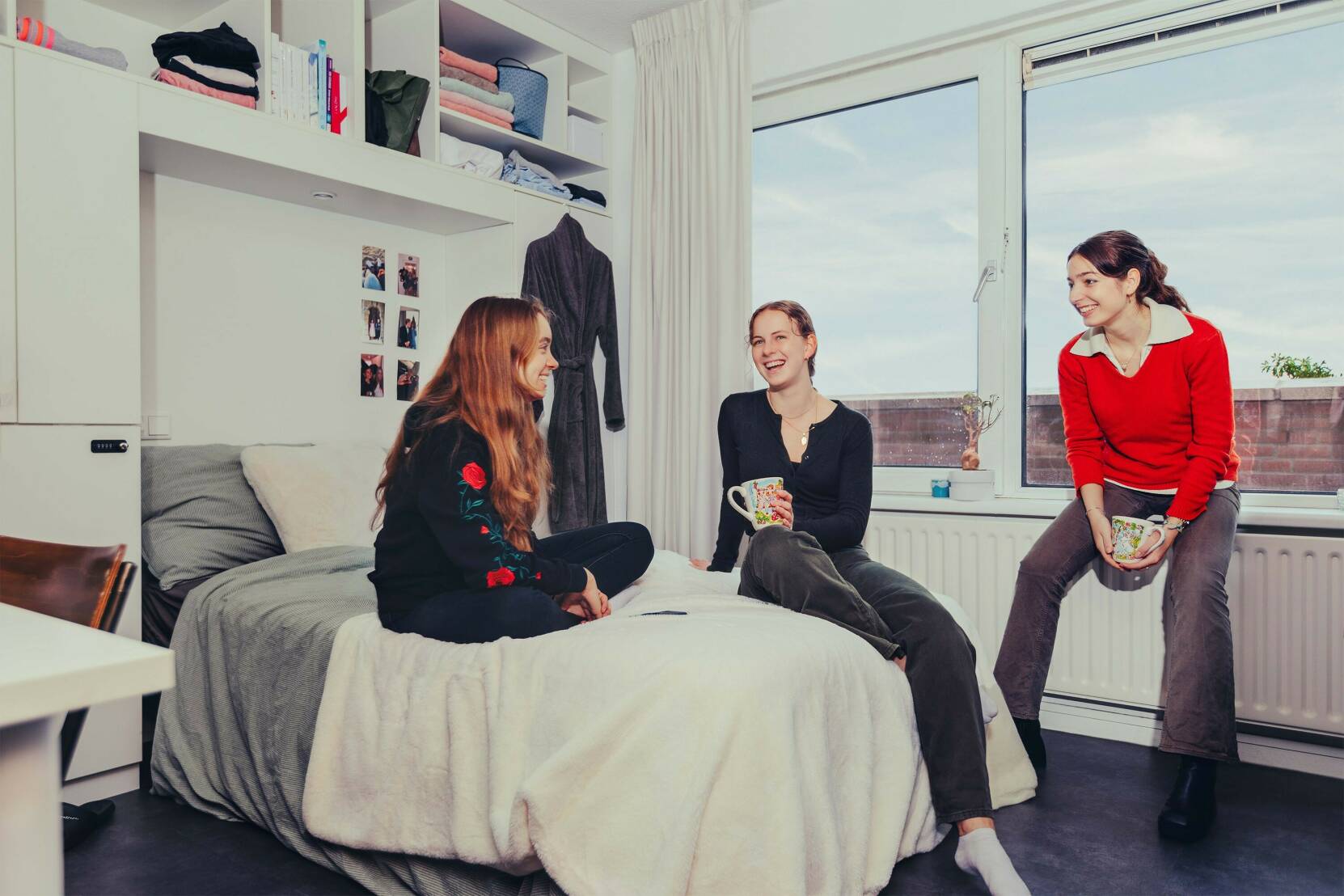
Students following the 4-year Bachelor programme live in the residential units in the Skotel (hotel/student accommodation) during their first year. They share a room with another student, mostly from a different nationality. There are 128 student units in Amsterdam and The Hague, resulting in 256 students living in the residential units, thus accommodating 512 students in total. These units have been sponsored by the various industry partners. The Skotel is seen as an integral part of HTH education and curriculum. The Skotel aims at personal development, offering an experience of hospitality and learning and applying intercultural competences. The Amsterdam Campus has the Skotel integrated within the school building, while this is a separate building in The Hague.
Skotel Experience

Special Feature: Small-Scale and Intensive Education
Hotel Accommodation
Skotel The Hague and Skotel Amsterdam offer respectively 21 and 20 hotel rooms to facilitate our practical education courses in years 1 and 2 of the Bachelor programme. This unique concept offers students ample learning opportunities while providing hotel guests a unique overnight experience. The hotel rooms are available to both internal and external guests and can be booked through the Skotel’s own website as well as through the main online travel agencies such as Booking.com and Expedia. In 2021, HTH joined the foundation Hotels for Trees, an initiative of an alumnus. The Skotel was one of the first hotels to take part, an example which was followed by many. Guests can choose to opt out of the complete housekeeping experience. The savings generated are used to plant trees.

Special Feature: Small-Scale and Intensive Education
Media Centre
The Media Centre has actively been involved in supporting for the HTH small-scale and intensive education by providing various interactive workshops, video content and creating Course Support Pages and Destination Guides for student research as well as participating in training for new LYCar coaches. See further details.
The Media Centre on The Hague Campus also offers a quiet room where students can reflect and work on their mental wellbeing with games and crafts in a relaxing, cozy environment. Recently, the Media Centre has reconvened the onboarding process for new lecturers to bring awareness of the sources and services the Media Centre can offer. In support of the innovated curriculum, Course Support Pages are currently being developed which give an overview of available resources and literature for each topic area. Finally, the Media Centre plays a role in fostering academic literacy and offers a consultation service on referencing and literature search.
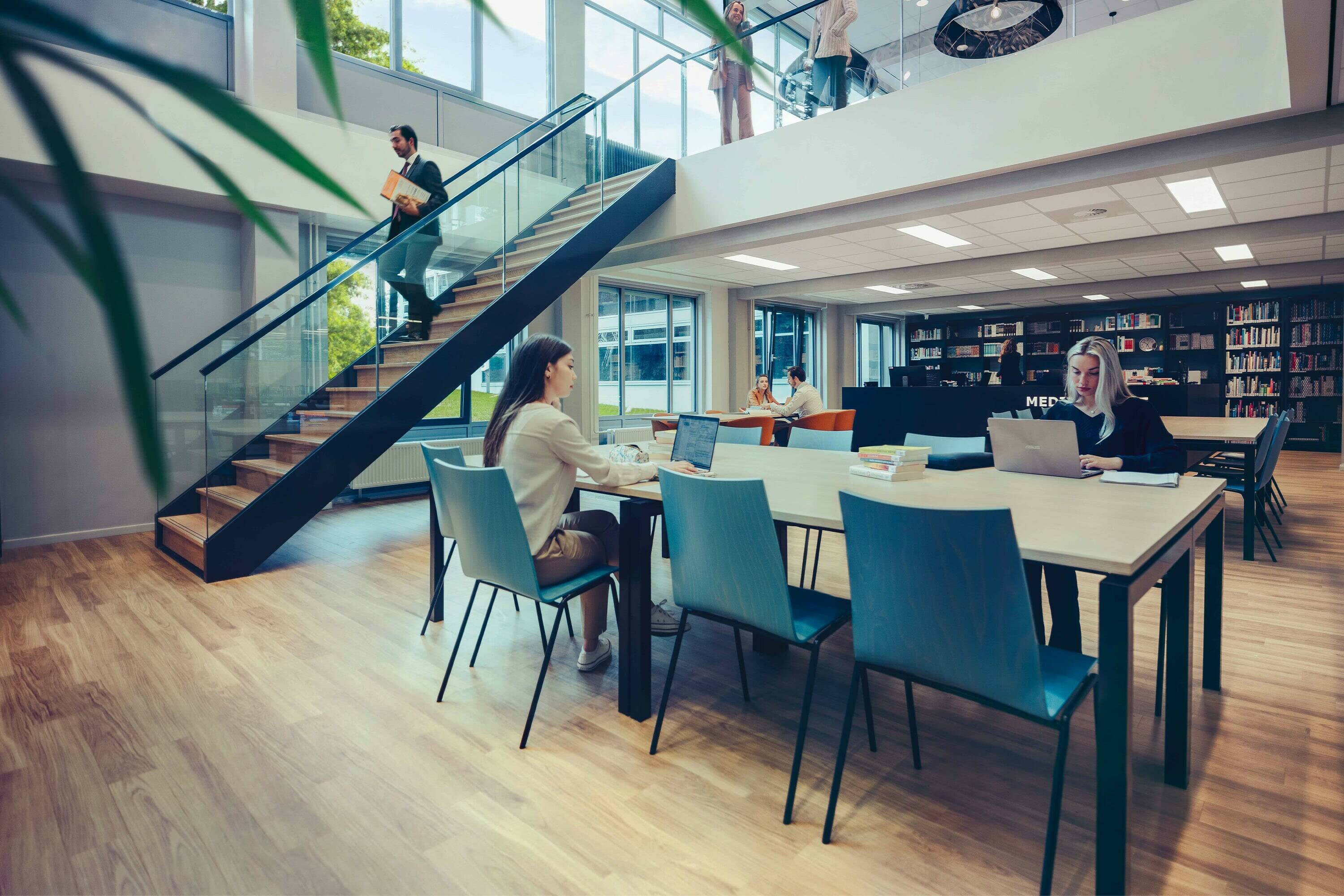

Special Feature: Small-Scale and Intensive Education
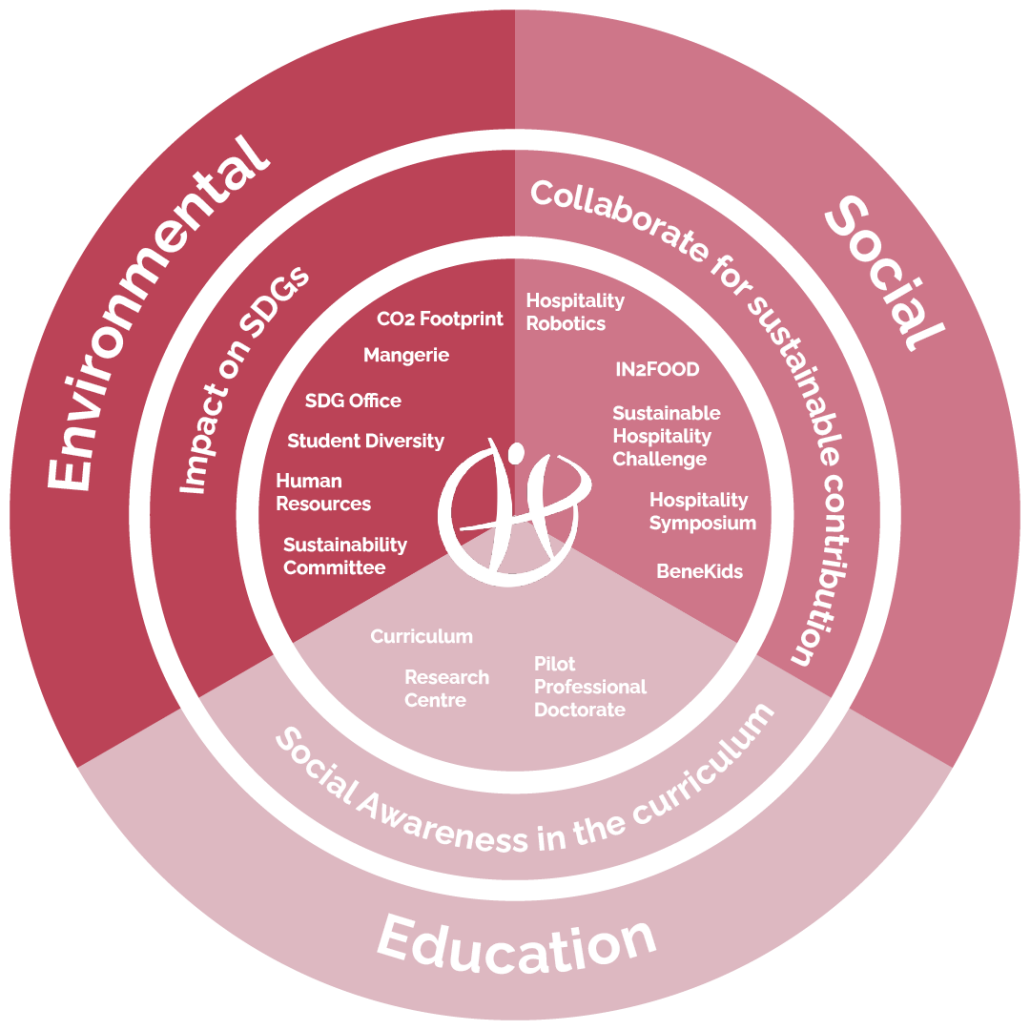
Since 2018, Hotelschool The Hague has embraced the UN Sustainable Development Goals (SDGs) as one of the three strategic objectives. We strive to provide education on how to operate organisations in a socially and environmentally responsible manner. Sustainability is also one of the main values within the school's manifesto and is reinforced through the curriculum PE/MO initiatives and assignments, co-and extracurricular initiatives/challenges, and design and daily practices on both HTH campuses. Our current initiatives contribute to the UN SDGs 3, 4, 5, 8, 11, 12, 13, 16 and 17.
Since 2021, in collaboration with the BA students, HTH issues a Sustainability Report which looks at the current compliance with our promises and commitments in terms of SDGs and ESG (Environmental, Social, and Governance) principles.
In this regard it is crucial to measure and monitor sustainable impact. As part of our yearly goals, we measure the CO2 footprint according to the established roadmap of HTH to reach the goal of Net Zero. In 2022 and 2023 we also evaluated our direct contribution to the UN SDGs in cooperation with the SDG Office which has recently been renewed.
Sustainable Development
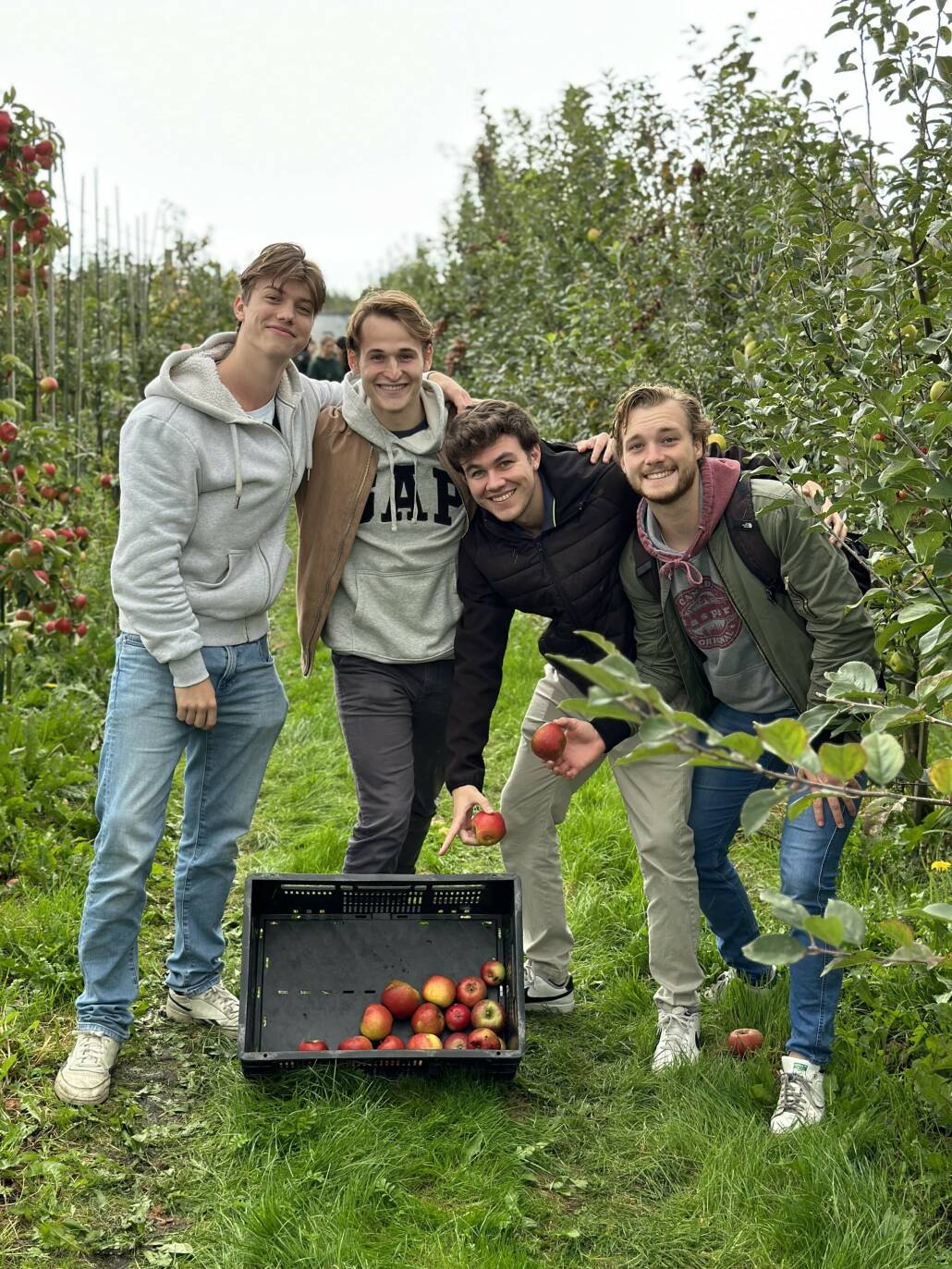
We aspire to further incorporate the SDGs by proactively connecting to our students and staff within all levels and programmes of HTH. We will continue to build on the many existing initiatives such as: Food Rescue, Water Cup Rescue, Global Citizenship, charity foundation School of Life, working together with relevant case companies and industry partners
Future Aspirations

Back to top
Back to Contents

Read Standard
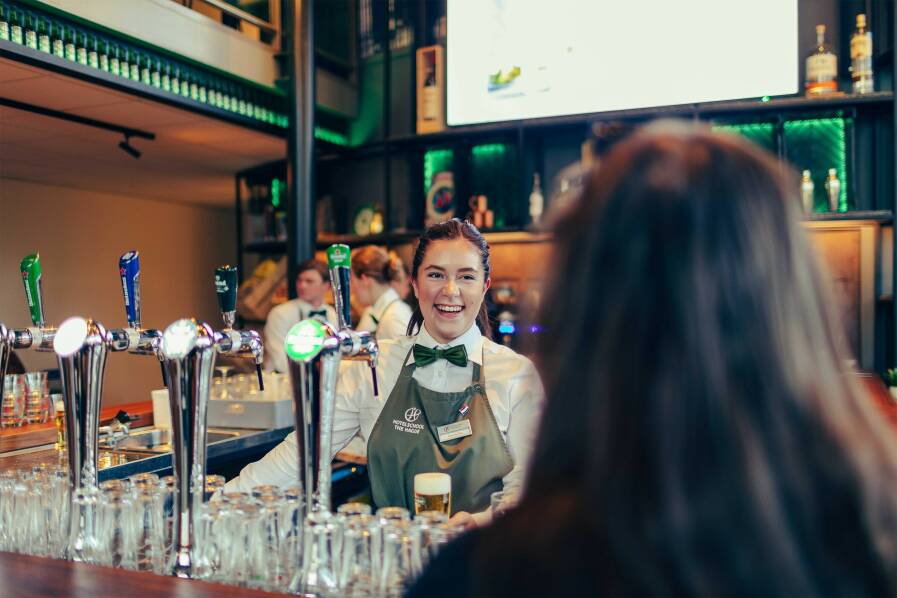
Both campuses of The Hague and Amsterdam are examples of innovative and successful Hospitality Education and profitability.
The facilities in Amsterdam and The Hague are not identical, as the buildings are different. Despite the differences between the buildings, students and staff in The Hague and Amsterdam have access to comparable facilities.
Additionally, both campuses have real-life lab environments, which enable us to offer practical education in all areas of the hotel operations at a high level of quality. Students apply their acquired theoretical knowledge in a practical environment and vice versa. Next to the practical skills of the different outlets, students develop management and leadership skills. Year 2 or Year 3 students lead international teams of Year 1 students. Cultural differences in the broadest sense of the word add an additional dimension to the educational process.
Milestones Completed

Special Feature: Small-Scale and Intensive Education
Hotelschool The Hague’s infrastructure is dedicated to supporting small-scale and intensive education. Beyond the classrooms, the campus provides essential amenities for students to engage in common extracurricular social activities. This comprehensive approach ensures that students not only excel academically but also have the resources and spaces needed to foster a strong sense of community and camaraderie. Staff in Amsterdam and The Hague work in open flexible office space. Whereas in Amsterdam, one floor of flexible space is open for students to connect with lecturers, in The Hague, there are dedicated so-called connectivity spaces where students and lecturers can meet in an informal setting. Students can book classrooms and individual meeting rooms to meet their academic and social needs and have dedicated spaces for HTH student associations and Extra Mile clubs. We believe that Hotelschool The Hague's commitment to providing state-of-the-art facilities enhances the overall learning experience and contributes to the success of its students.
HTH Restaurants
In restaurant Le Début (TH and AMS campus) students perform at both the kitchen and the restaurant. The restaurants allow students to experience the operations of Fine Dining at a high culinary level. Both restaurants are open to internal and external guests.
Mangerie (AMS) and Foodcourt (TH) are both large restaurants where students and employees come together for lunch and dinner. Campus TH has recently been transformed into a Food Court including a Taste Lab with the addition of a new vegan/vegetarian concept named Roots.
Recently, Zinq (TH) and Saveurs (AMS) have both been refreshed in order to stay current and up to date with a modern trendy interior. In addition, both TH and AMS have a Bar which means the TH campus now has 4 RLLs where students, employees and externals can experience how social student life, real life learning and industry merge at HTH.

Special Feature: Small-Scale and Intensive Education
Skotel Experience
Students following the 4-year Bachelor programme live in the residential units in the Skotel (hotel/student accommodation) during their first year. They share a room with another student, mostly from a different nationality. There are 128 student units in Amsterdam and The Hague, resulting in 256 students living in the residential units, thus accommodating 512 students in total. These units have been sponsored by the various industry partners. The Skotel is seen as an integral part of HTH education and curriculum. The Skotel aims at personal development, offering an experience of hospitality and learning and applying intercultural competences. The Amsterdam Campus has the Skotel integrated within the school building, while this is a separate building in The Hague.
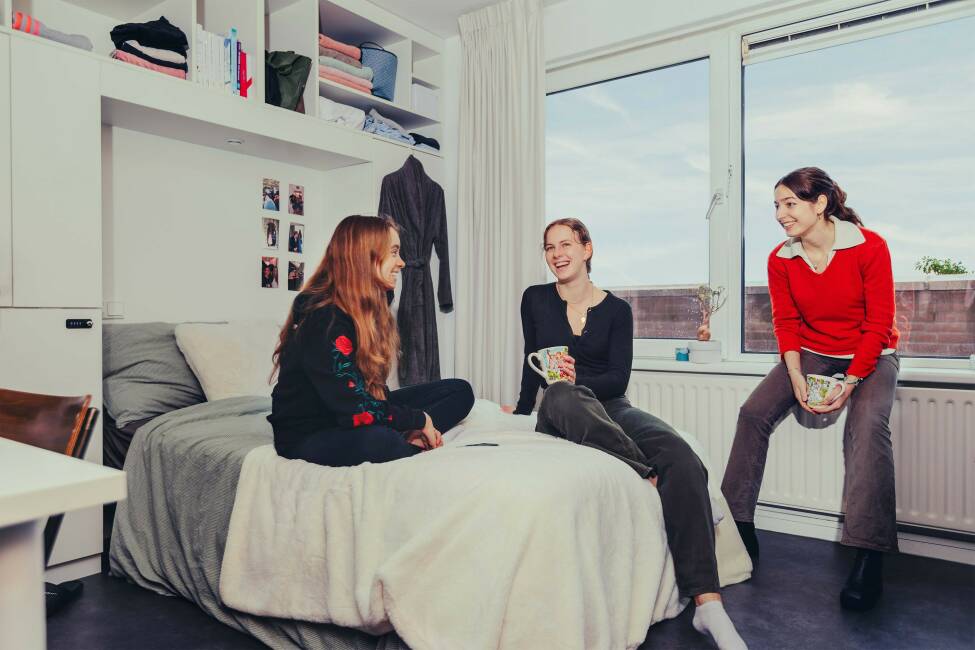
Hotel Accommodation

Special Feature: Small-Scale and Intensive Education
Skotel The Hague and Skotel Amsterdam offer respectively 21 and 20 hotel rooms to facilitate our practical education courses in years 1 and 2 of the Bachelor programme. This unique concept offers students ample learning opportunities while providing hotel guests a unique overnight experience. The hotel rooms are available to both internal and external guests and can be booked through the Skotel’s own website as well as through the main online travel agencies such as Booking.com and Expedia. In 2021, HTH joined the foundation Hotels for Trees, an initiative of an alumnus. The Skotel was one of the first hotels to take part, an example which was followed by many. Guests can choose to opt out of the complete housekeeping experience. The savings generated are used to plant trees.


Special Feature: Small-Scale and Intensive Education
Media Centre
The Media Centre has actively been involved in supporting for the HTH small-scale and intensive education by providing various interactive workshops, video content and creating Course Support Pages and Destination Guides for student research as well as participating in training for new LYCar coaches. See further details.
The Media Centre on The Hague Campus also offers a quiet room where students can reflect and work on their mental wellbeing with games and crafts in a relaxing, cozy environment. Recently, the Media Centre has reconvened the onboarding process for new lecturers to bring awareness of the sources and services the Media Centre can offer. In support of the innovated curriculum, Course Support Pages are currently being developed which give an overview of available resources and literature for each topic area. Finally, the Media Centre plays a role in fostering academic literacy and offers a consultation service on referencing and literature search.

Special Feature: Small-Scale and Intensive Education
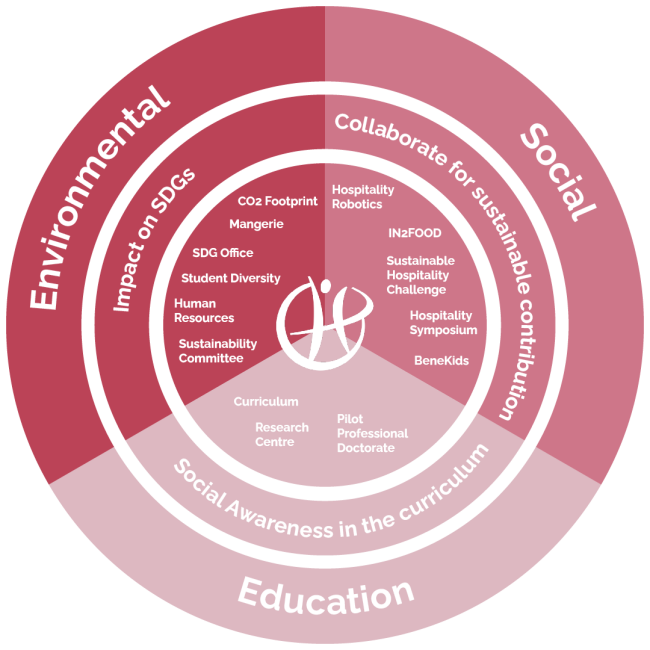
Since 2018, Hotelschool The Hague has embraced the UN Sustainable Development Goals (SDGs) as one of the three strategic objectives. We strive to provide education on how to operate organisations in a socially and environmentally responsible manner. Sustainability is also one of the main values within the school's manifesto and is reinforced through the curriculum PE/MO initiatives and assignments, co-and extracurricular initiatives/challenges, and design and daily practices on both HTH campuses. Our current initiatives contribute to the UN SDGs 3, 4, 5, 8, 11, 12, 13, 16 and 17.
Since 2021, in collaboration with the BA students, HTH issues a Sustainability Report which looks at the current compliance with our promises and commitments in terms of SDGs and ESG (Environmental, Social, and Governance) principles.
In this regard it is crucial to measure and monitor sustainable impact. As part of our yearly goals, we measure the CO2 footprint according to the established roadmap of HTH to reach the goal of Net Zero. In 2022 and 2023 we also evaluated our direct contribution to the UN SDGs in cooperation with the SDG Office which has recently been renewed.
Sustainable Development
We aspire to further incorporate the SDGs by proactively connecting to our students and staff within all levels and programmes of HTH. We will continue to build on the many existing initiatives such as: Food Rescue, Water Cup Rescue, Global Citizenship, charity foundation School of Life, working together with relevant case companies and industry partners
Future Aspirations
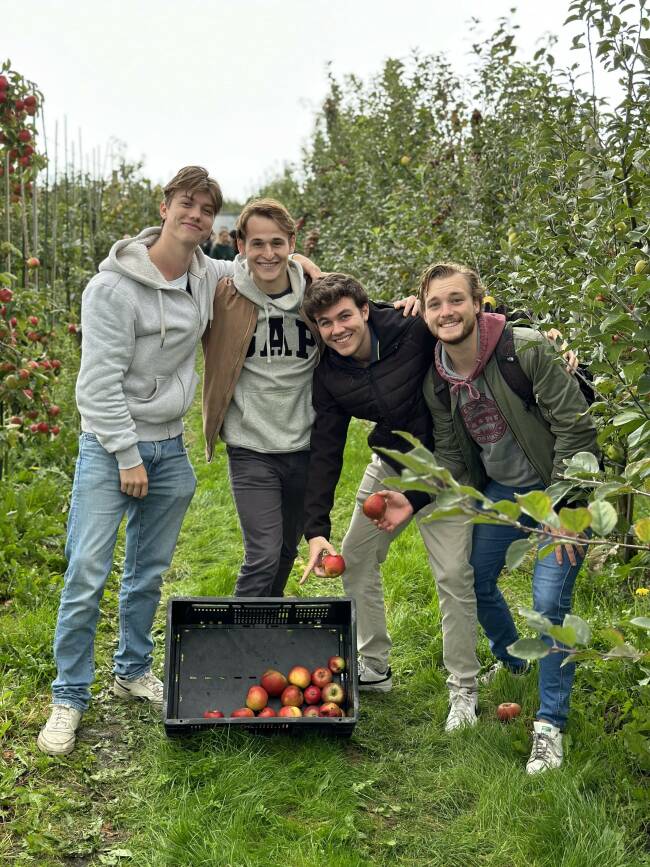

Back to top
